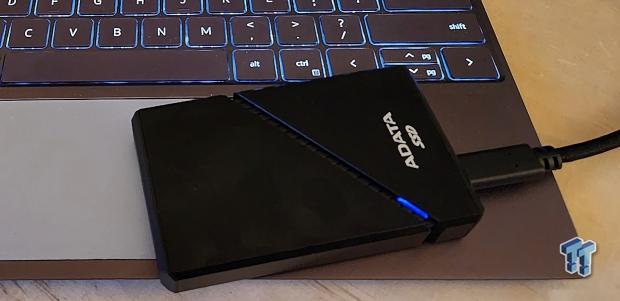
The Bottom Line
Pros
- + Fastest external drive ever tested
- + Cool running
- + Best performing
Cons
- - None
Should you buy it?
AvoidConsiderShortlistBuyIntroduction & Drive Details
ADATA's SE920 external pocket portable SSD represents only the second USB4 device we've gotten in for testing. The first came a little over a year ago when we got our hands on Orico's Montage pocket sized USB4 external SSD. At up to 3,200 MB/s, the Montage delivered the highest read throughput of any bus-powered pocket portable storage device we had ever tested, holding on to that record until today.
Today, we have something even faster, and unlike the Montage, it thoroughly dominates on the performance front in addition to attaining the highest throughput of any device of its type. ADATA describes its newest portable offering as follows:
"The SE920 utilizes the latest generation USB4 transmission interface with a read/write of 3,800/3,700MB per second, and its heat dissipation system is equipped with a built-in micro fan. Simply pushing on the casing extends the chassis to quickly discharge heat. When the extendable case is retracted, volume is reduced, facilitating storage. This ingenious "patented active cooling" design significantly reduces temperatures by 10% compared with fanless products of the same specifications and has won the Red Dot Design Award, Japan GOOD Design Award, and Taiwan Excellence Award in 2022 and 2023."
ADATA specifically designed an active cooling mechanism for the ultra-high-performance SE920. Activating the built-in micro fan effectively lowers IC temperatures by approximately 12% to maintain high-speed transfer performance and case temperature at 50°C, remaining comfortable to the touch throughout a grueling hour-long burn-in test. Impressive.
The SE920 is a dual-interfaced device capable of delivering up to 3,800 MB/s over USB4 or Thunderbolt4, PC, or MAC. It's not super compact relative to some of the smaller pocket-friendly storage devices out there, but if you can fit a deck of cards in your pocket, you can certainly pocket the SE920.
Drive Details
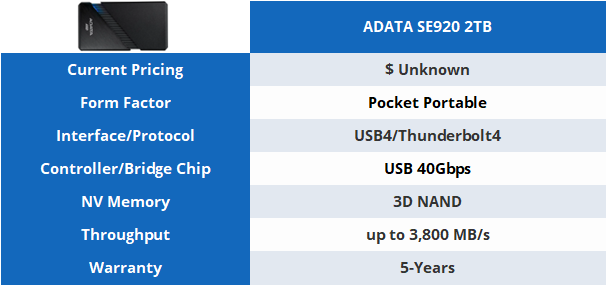
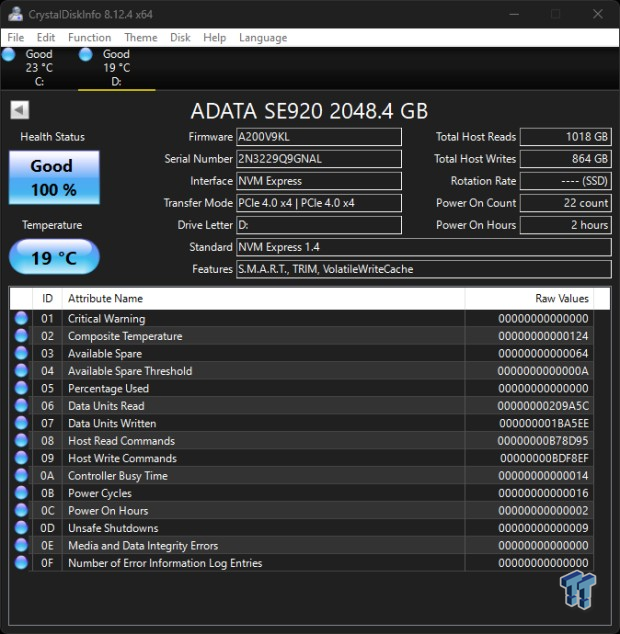
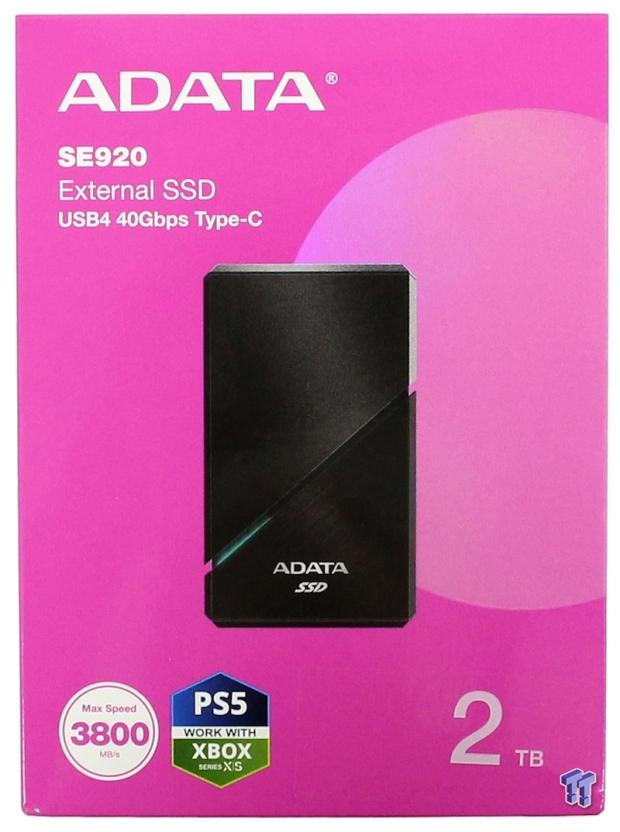
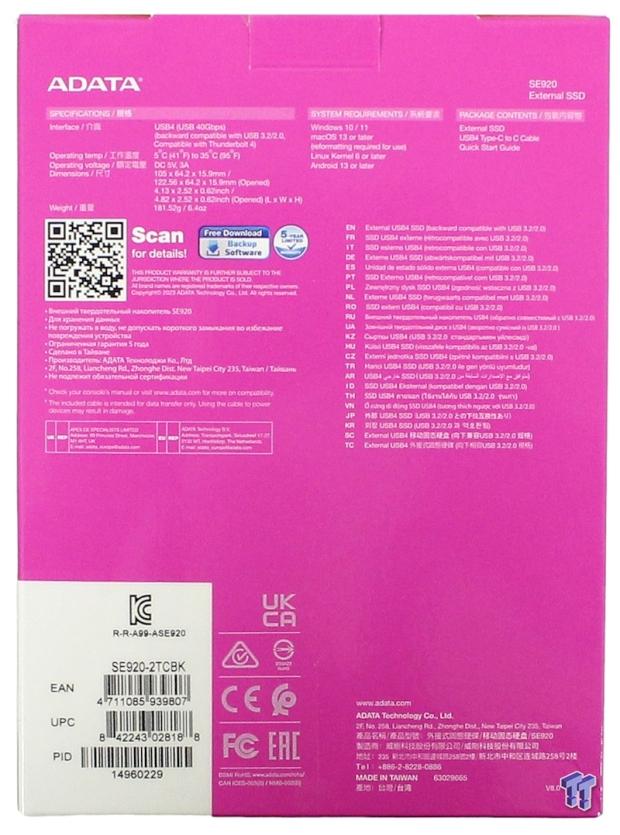
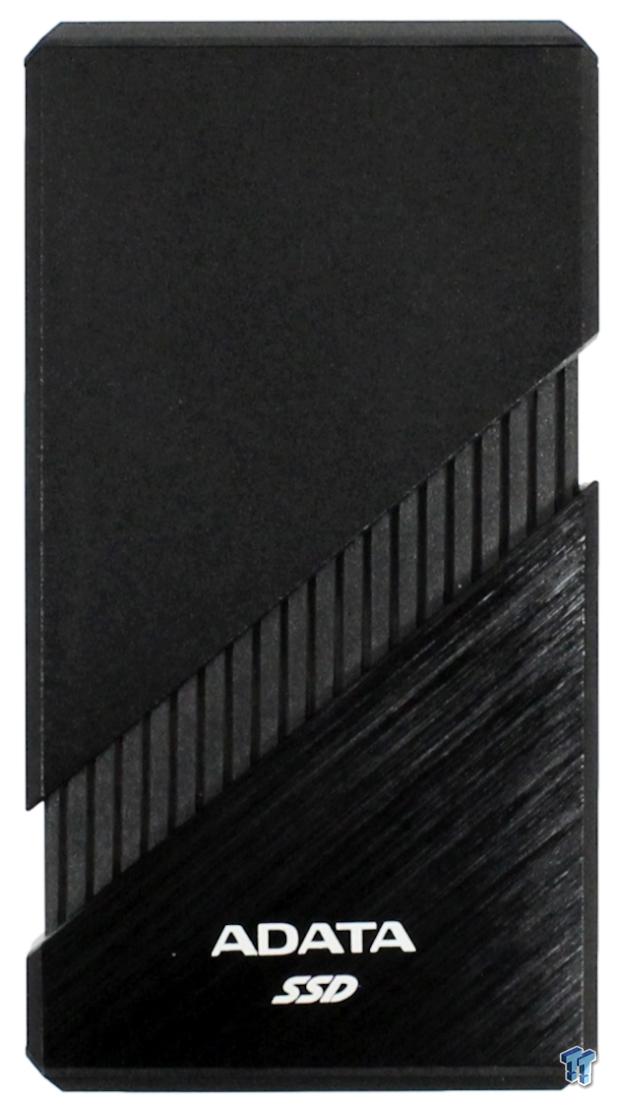
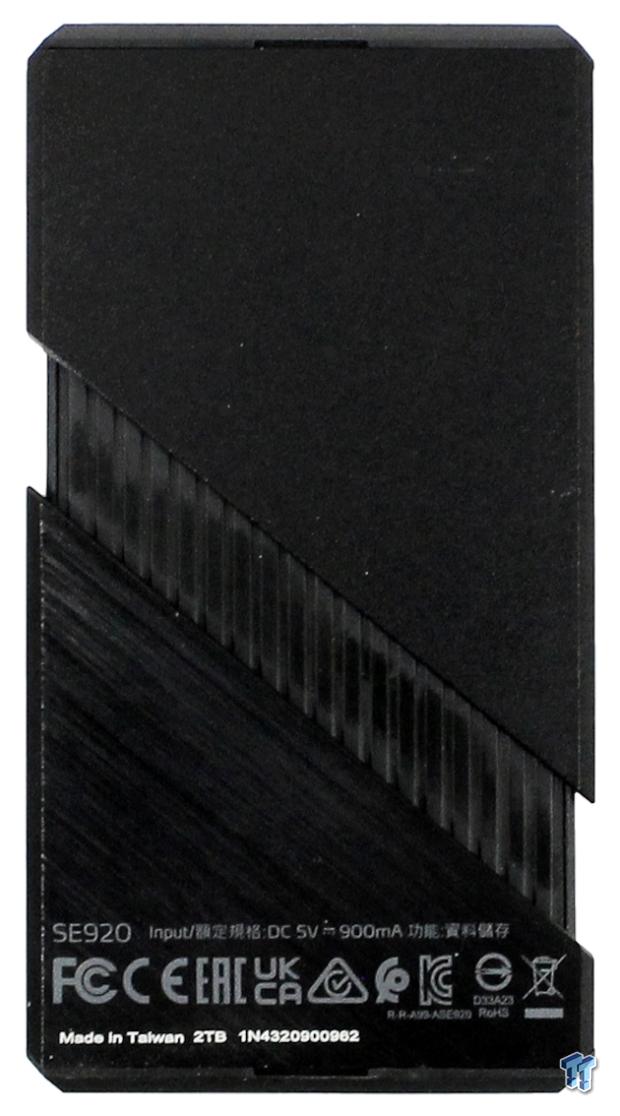
Pricing is a bit of a mystery at this point. The SE920 comes with what we will describe as the highest quality, most perfectly sized sleeved USB Type-C cable we've come across to date.
Synthetic Benchmarks: CDM, ATTO & Blackmagic
CrystalDiskMark
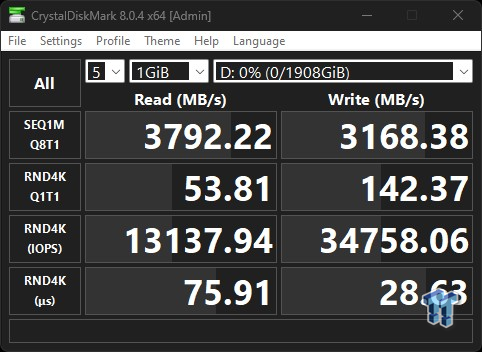
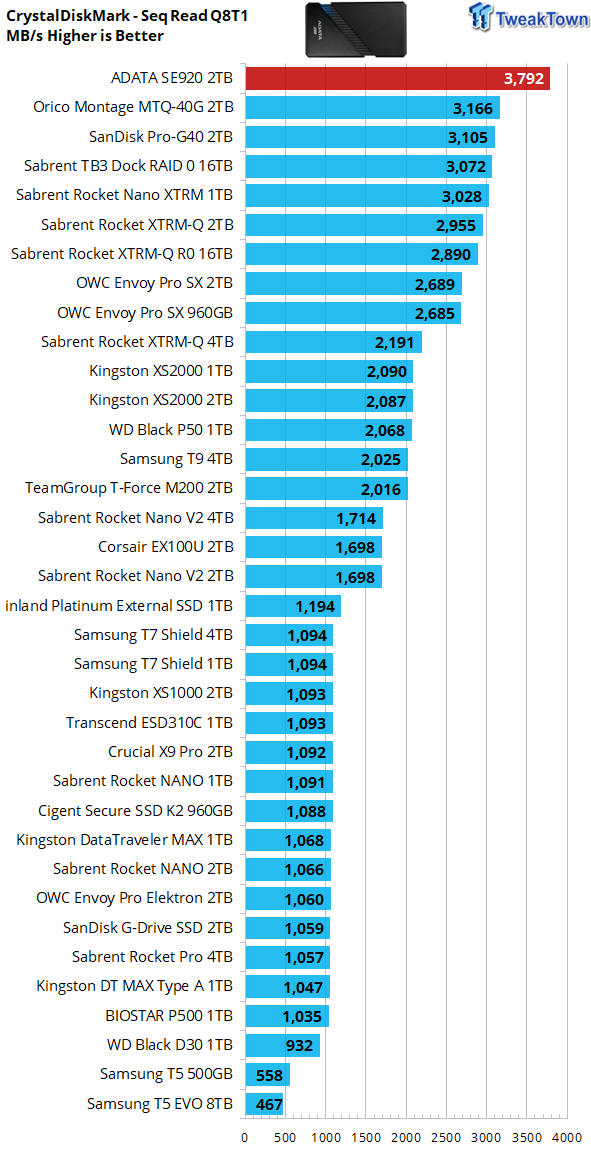
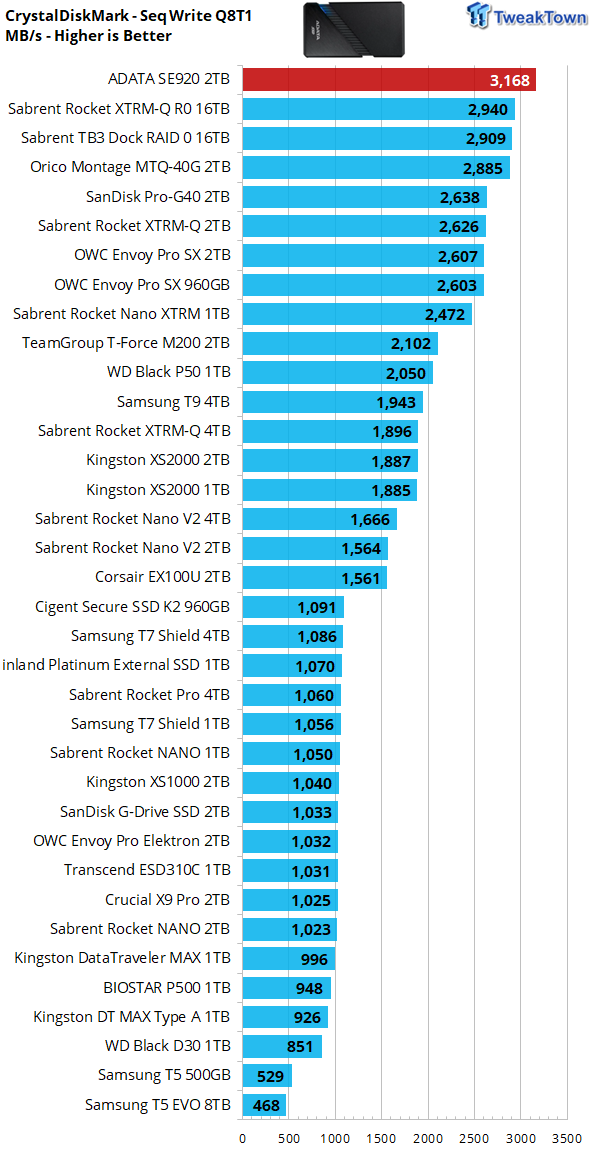
And there you have it, 3,800 MB/s read throughput at QD8. Impressive. ADATA states the drive can hit up to 3,700 MB/s sequential write throughput at QD32 over USB4. We have no doubt that it can, but we test at QD8, not QD32, and there we are getting roughly 3,200 MB/s, which is easily the highest we've ever seen from any external storage device.
ATTO
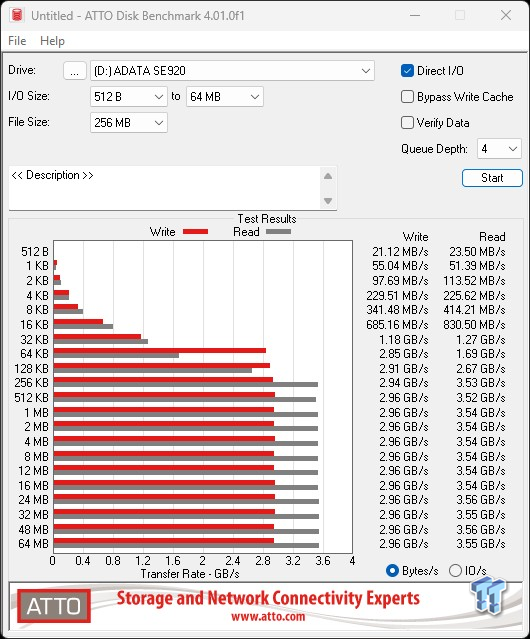
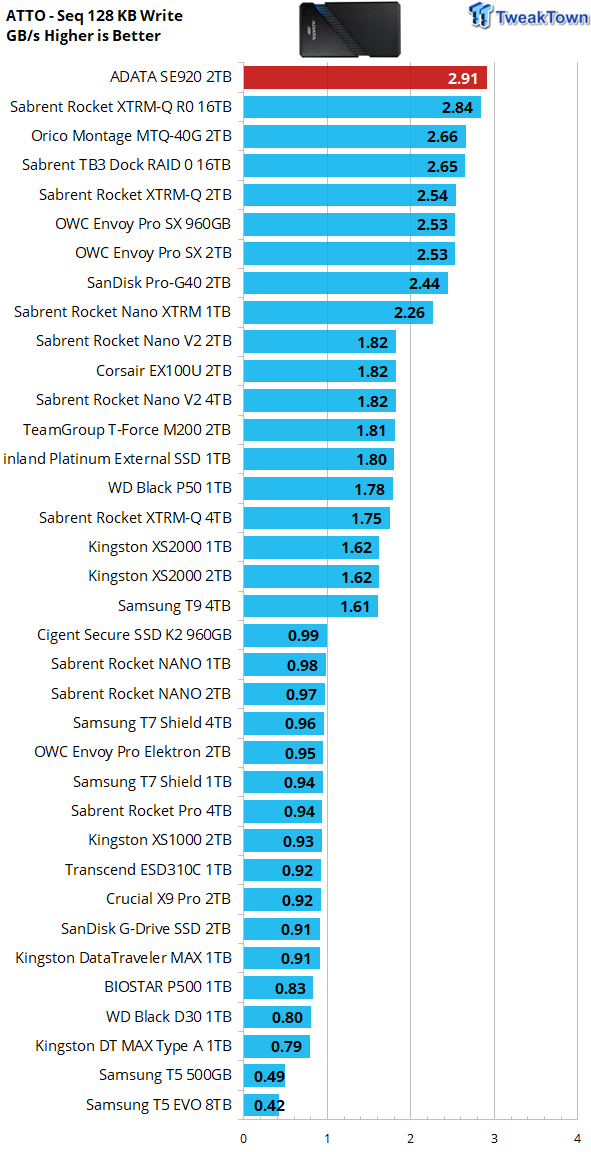
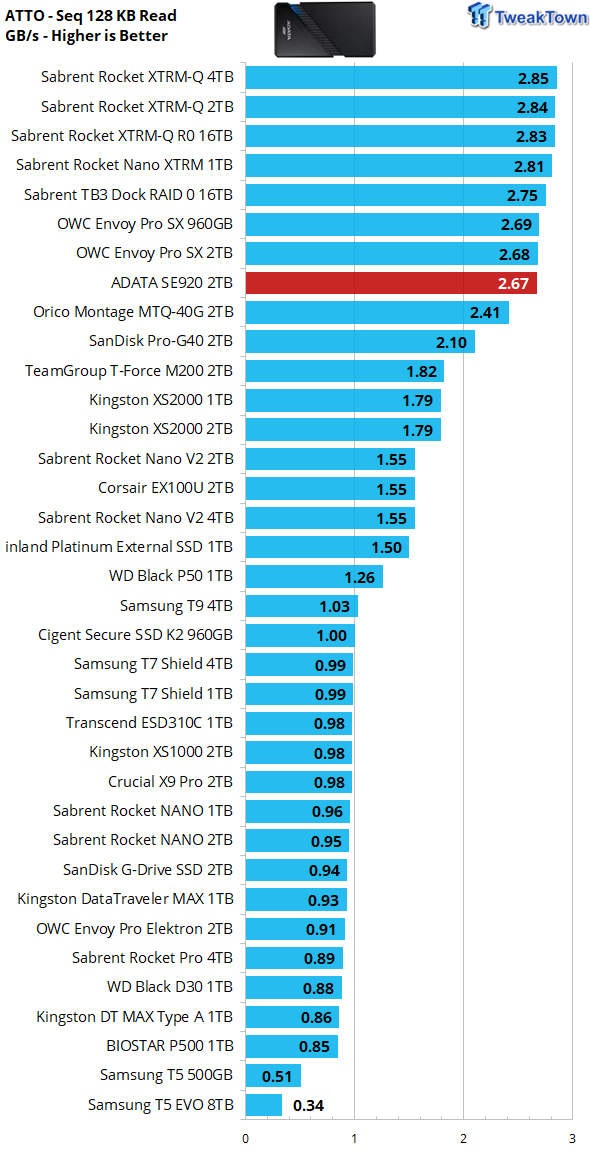
ATTO demonstrates the SE920 capable of delivering full sequential throughput at 256K transfers. At 128K, which is what we chart, the SE920 delivers another lab record for QD4 write throughput.
Blackmagic
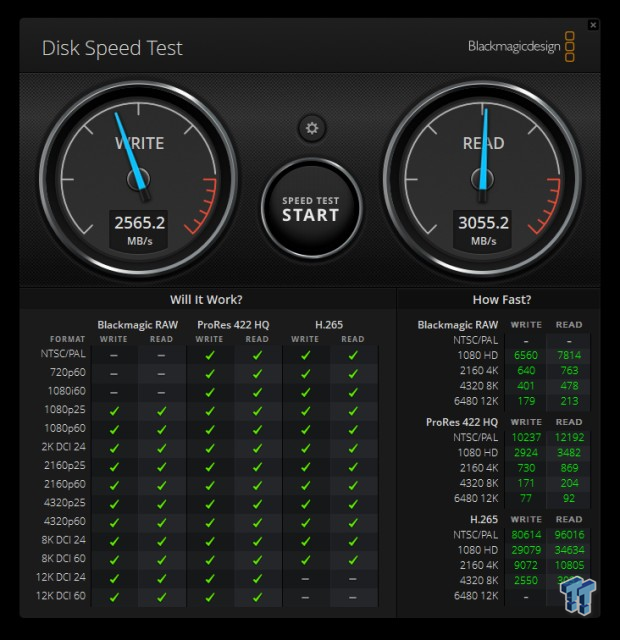
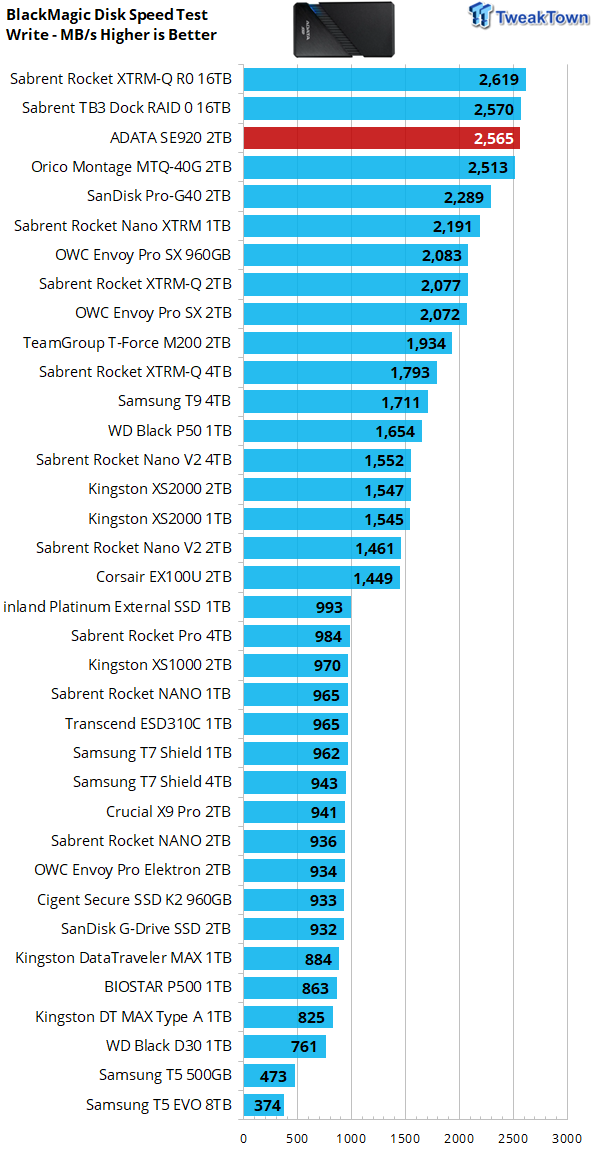
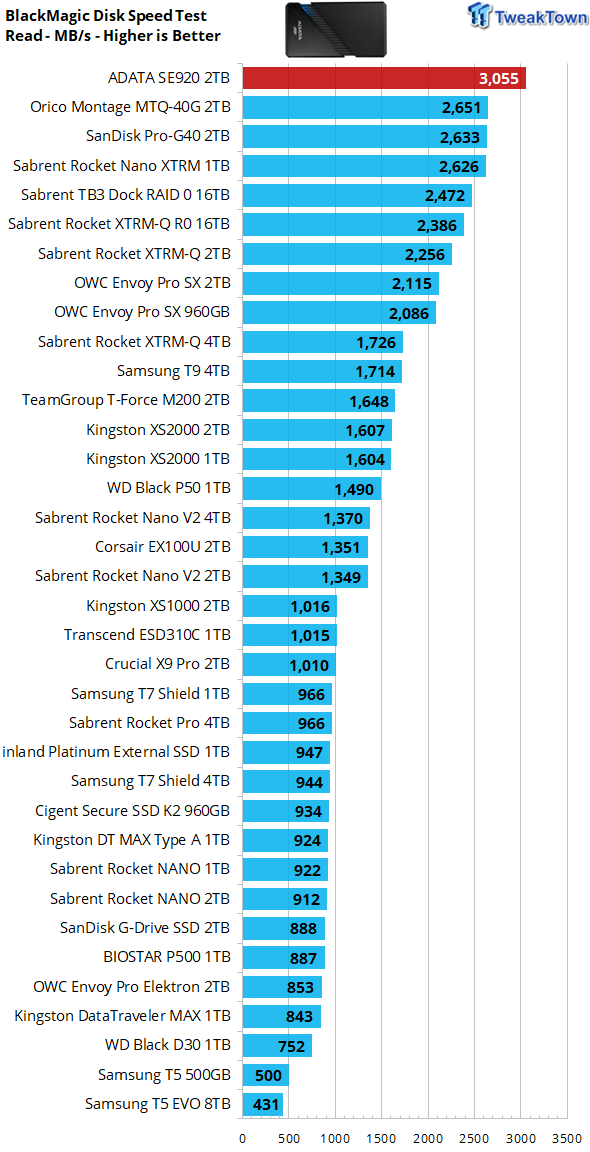
When serving data to the host (reading), we find our test subject delivering more than 400 MB/s better than anything before it. Outstanding. When writing to the disk, the SE920 is only outdone by externally powered raided devices and then only by a few MB/s. We see that as a win for the SE920 because it is bus-powered and pocket-portable.
Real-World Testing: PCMark 10, 3DMark SSD Gaming & Transfer Rates
PCMark 10 Data Drive Benchmark
The Data Drive Benchmark is designed to test drives that are used for storing files rather than applications. You can also use this test with NAS drives, USB sticks, memory cards, and other external storage devices.
The Data Drive Benchmark uses 3 traces, running 3 passes with each trace as follows:
- Copying 339 JPEG files, 2.37 GB in total,?into?the target drive (write test).
- Making a copy of the JPEG files (read-write test).
- Copying the JPEG files to another drive (read test).
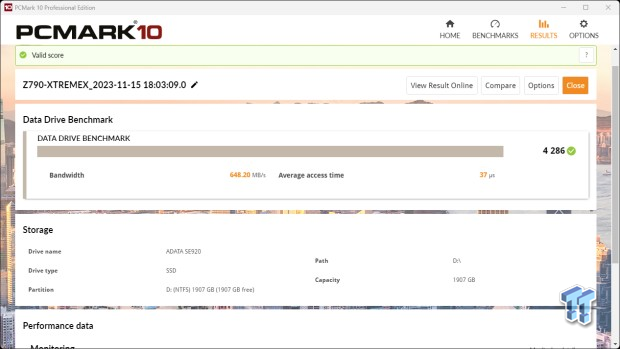
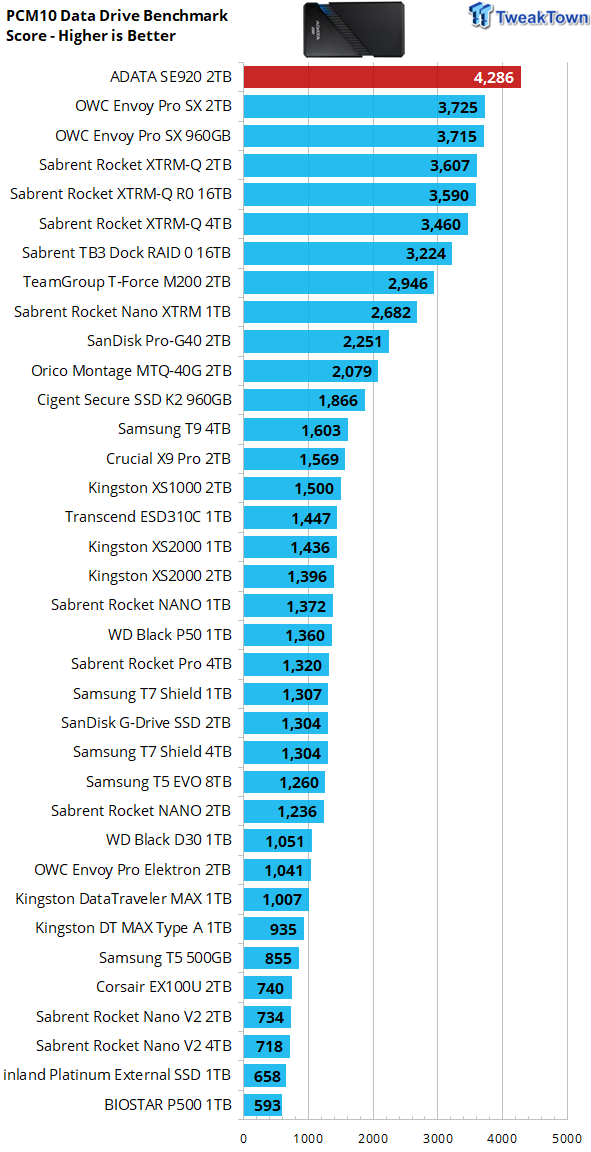
Our test subject absolutely demolishes the competition here, where performance really matters. This indicates that on-device editing can be done at higher levels than ever before possible with a pocket-sized portable.
3DMark SSD Gaming Test
UL's newest 3DMark SSD Gaming Test is the most comprehensive SSD gaming test ever devised. We consider it superior to testing against games themselves because, as a trace, it is much more consistent than variations that will occur between runs on the actual game itself. This test is the same as running the actual game, just without the inconsistencies inherent to application testing. In short, we believe that this is the world's best way to test an SSD's gaming prowess and accurately compare it against competing SSDs. The 3DMark SSD Gaming Test measures and scores the following:
- Loading Battlefield V from launch to the main menu.
- Loading Call of Duty Black Ops 4 from launch to the main menu.
- Loading Overwatch from launch to the main menu.
- Recording a 1080p gameplay video at 60 FPS with OBS (Open Broadcaster Software) while playing Overwatch.
- Installing The Outer Worlds from the Epic Games Launcher.
- Saving game progress in The Outer Worlds.
- Copying the Steam folder for Counter-Strike Global Offensive from an external SSD to the system drive.
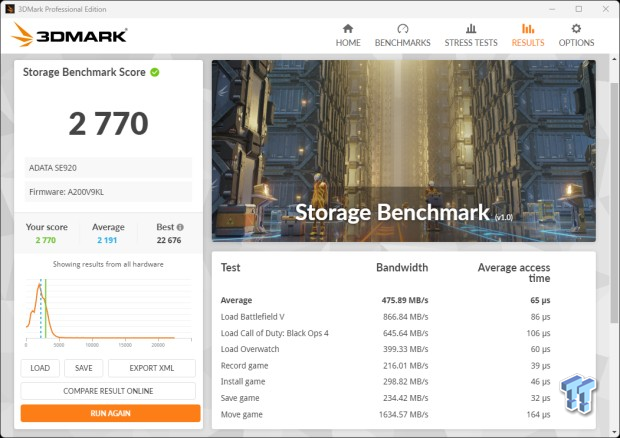
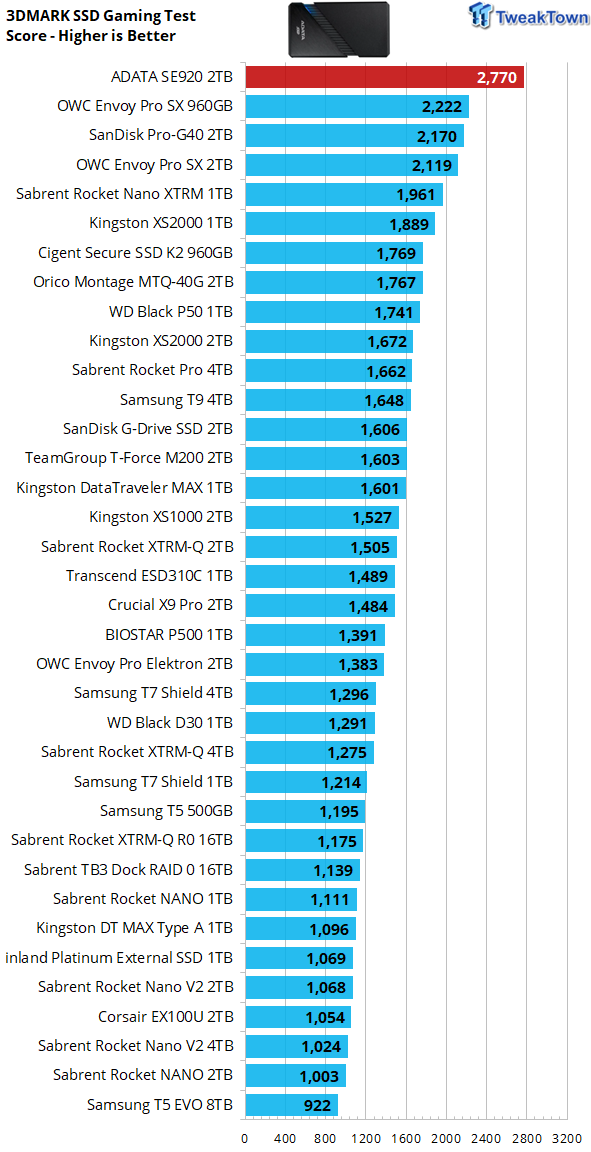
Gaming is a performance metric that matters to most DIY consumers, especially to the enthusiast crowd that TweakTown caters to. We are now including gaming performance as a part of our external SSD reviews, as using portable storage for gaming duties is very popular among avid gamers.
Portable, compatible game storage is a nice complement to any console or PC gaming device. In addition to being by far the highest performing of its kind we've ever tested, the SE920 can deliver gaming performance rivaling that of many internal SSDs. Impressive.
DiskBench - Transfer Rates
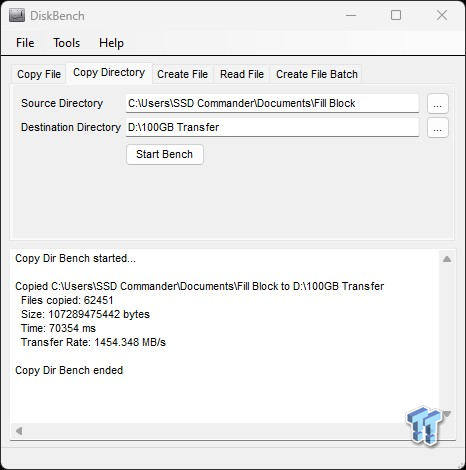
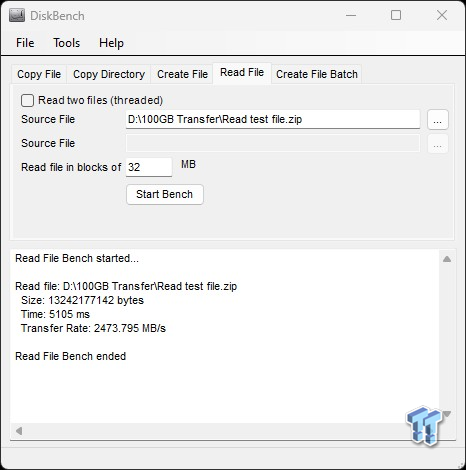
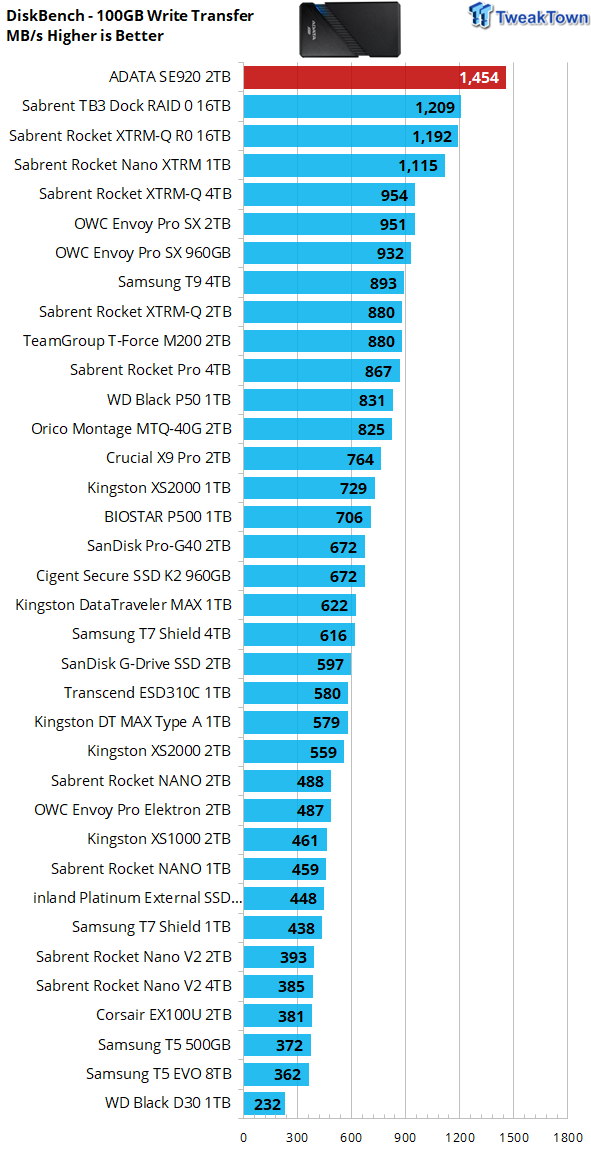
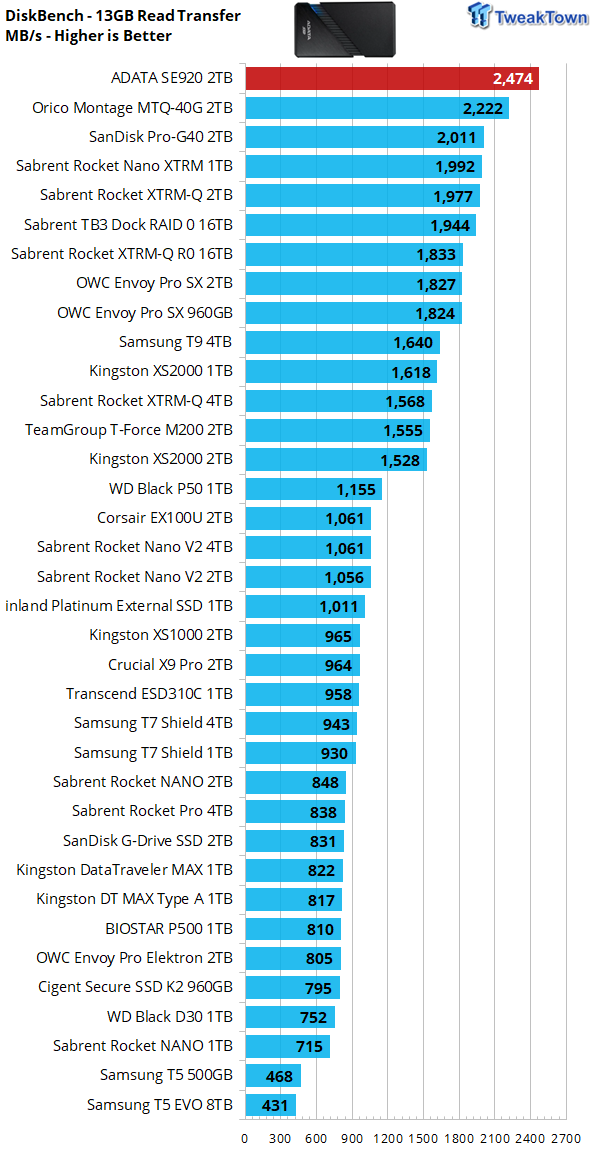
We brutalize our test subjects with our extremely hard-to-swallow 100GB data block. This data block is the same one we use for our internal SSD testing and is composed of more than 62K files. As we see it, 100GB is probably right at the upper limit for a single transfer, so again, as we see it, this is a much more realistic test scenario than a sustained filling of the entire drive. Again, our test subject delivers massively and does so where the rubber meets the road for a portable storage device.
Final Thoughts
USB4 has been around for quite some time now, but there have not been nearly as many storage devices based upon this interface as we would expect. We've only come across two of them, which is crazy considering the level of performance on offer, as perfectly demonstrated by ADATA's SE920.
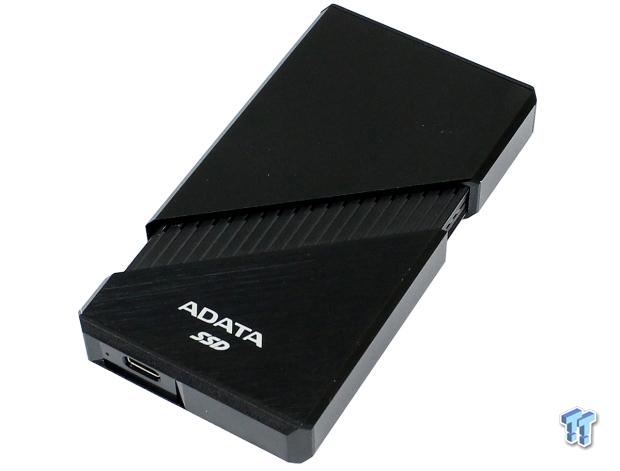
ADATA's newest portable is by far the fastest, best-performing device of its kind we've ever tested and, as such, is well deserving of our highest award. Editor's choice.

